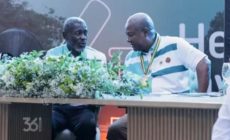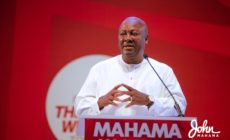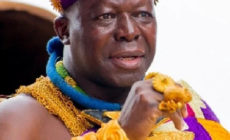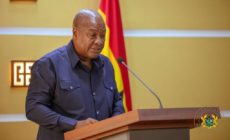Soldiers bombard Prez. Mahama at Burma Camp
- Posted on
- Comment
 President John Mahama yesterday tasted the anger and frustration of the officers and men of the Ghana Armed Forces (GAF) when he visited the Burma Camp military base in Accra.
President John Mahama yesterday tasted the anger and frustration of the officers and men of the Ghana Armed Forces (GAF) when he visited the Burma Camp military base in Accra.
He was there to commission a newly built headquarters for the Ghana Navy; and as the Commander-in-Chief of the GAF, was spotted in full military uniform.
His appearance at the place in a military uniform was a surprise to many who had gathered there since it was the first time they were seeing him in such an outfit.
Many were those who stood in awe when they saw the president arriving at the event in the military camouflage with a pair of army desert boots to match.
But he was not spared the anger of the soldiers during an open forum as they vented their spleen on him.
The various military barracks have been the scene of tension owing to discrimination, favoritism, nepotism and political connections, eroding the esprit de corps mantra.
Appointments and promotions are now exercised on tribal and political lines rather than on merit, dampening the spirit of officers and men in uniform.
Like their fellow Ghanaians, the soldiers complained bitterly about their conditions of service which they said was nothing worth writing home about – a situation they said had led to most of their colleagues dying prematurely due to poverty after retirement.
Some expressed disappointment in the unfairness of the system, comparing the case of a soldier who had served 25 years or more and retiring on a paltry pension to a Member of Parliament (MP) who only gets to serve for four years in parliament with a fat ex-gratia to take home.
They also expressed disappointment in the fact that they now struggle to get otherwise basic accoutrements such as uniforms and boots for work, and even have to bear the costs themselves.
The uniformed men and women also charged the president to see to the payment of their allowances, especially for peace keeping, and other basic incentives.
At the end of the day, President Mahama announced an increment in the allowance for peace-keeping by $1, bringing the total allowance to $31 per day.
“Since late JEA Mills increased the rate [in 2009] there has been no increment….we have decided to increase it by $1 a day, the rate that is paid to peace-keeping soldiers,” he said.
The peace keeping allowance was increased from $16 to $27 per day when President Kufuor assumed office in 2001 and Mills/Mahama moved it to $30 from 2009 and $31 in 2016.
In response to the concerns expressed, he assured the soldiers of prompt payment of allowances which had been a source of worry in the army.
NDC Eight Years
President Mahama conceded that the NDC had been in office for eight years, claiming that when they took office in the year 2009, the Armed Forces was in “a very poor state” logistically.
That, he said, was partly because the Navy ships available were old and not sea worthy while the Air Force had difficulty with getting platforms to fly with a shortage of vehicles in the Army.
But today, President Mahama said, “Things are much better than they were when we met them.”
He talked of a number of infrastructural and logistical developments in the Armed Forces, including three new troop transport carriers for the Air Force, which he said are currently serving in Mali on a United Nations mission, with the two in use in Ghana.
Apart from that, he also indicated that government had procured four new MH17 helicopters and four new Z9 helicopters for the Air Force and six new vessels for the Navy. He insisted, “A lot of progress has been made in re-tooling the service since 2009.”
The president however, expressed concern about the rate of encroachment on military lands by private citizens and estate developers, a trend he said government had started taking measures to stall.
“We have started with Burma Camp already…you could see that the walls are coming up,” he said.
Strangely, some of the encroachments are said to be perpetrated by senior military officers and top government officials who are grabbing military lands, putting up mansions and real estates for sale.
By Charles Takyi-Boadu










 (Selorm) |
(Selorm) |  (Nana Kwesi)
(Nana Kwesi)